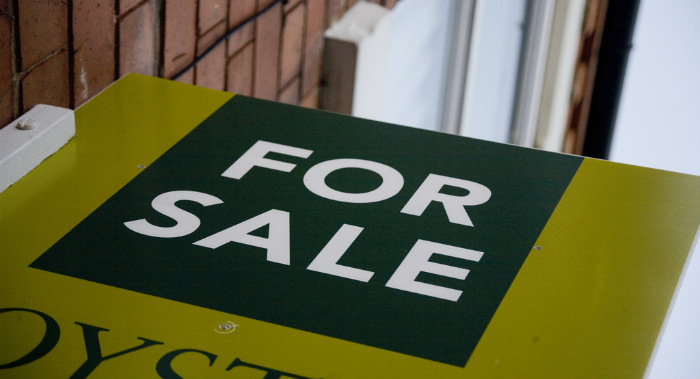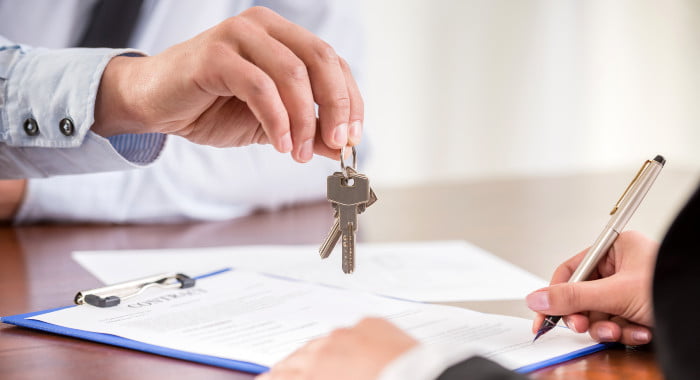The end of a relationship can be a difficult time. And having to deal with a divorce just adds to the stress, with so many things to sort out. One of which is to find out how to sell a house during a divorce.
There’s no doubt that among the emotional upheaval of a divorce, deciding what to do with a house you have bought with your spouse can become complicated.
Depending on the situation of the couple, it might be necessary or desirable to sell the home. This begs the question: how to sell a house during a divorce?
While the actual process of selling a house during a divorce is no different to selling a house at any other time, it is more complicated and there are many things to consider.
Because the house will be part of the matrimonial assets, it belongs to both parties equally. As a result, selling it can get complicated. But let’s shed some light on this question…
Process of selling a house during a divorce

As we have said, the process to sell a house during a divorce is the same as in a normal scenario:
- Get your house valued and engage an estate agent
- Conduct viewings and accept a reasonable offer
- Engage a solicitor to handle the conveyancing process
- Answer any enquiries from the buyer
- Prepare for moving day
- Move out
However, to fully answer the question of how to sell a house during a divorce, we have to address the complicated and sometimes challenging aspects this brings with it.
Ownership of the home
First let’s talk about ownership. Who owns the marital home? Let’s start with the most simple scenario: the house is owned jointly by both spouses and both names are on the title deeds.
In that case, the home becomes part of the matrimonial assets and funds from the sale will be divided between the parties. How they will be divided depends on the individual circumstances of the divorcing partners. We will get to this a bit later.
If the house is only in the name of one partner, then ownership will depend on when it was bought, how the house was used and who lived in it. The following scenarios are possible:
House was bought before marriage to be let out

If one spouse has bought the house before the marriage, and it’s this partner’s name only, then who it belongs to will depend on how it was used.
For the home to be classed as a matrimonial asset, the other partners must have lived in it during the marriage, or it must have been bought for this purpose.
But if the house was bought to, let’s say, rent it out, then it will be classed as a non-matrimonial asset and belongs only to the partner in whose name it is.
House was bought before marriage as home for couple
A property that was purchased by one spouse before the marriage but was used as the marital home would be classed as a matrimonial asset. This means that even if the property is only in the name of one partner, it will be seen as belonging to both.
That’s because it’s assumed that both partners have contributed to the maintenance of the house, maybe even mortgage payments.
Even if that’s not the case, the house can still be seen as a marital asset, if the spouse that isn’t named on the deeds can show that they won’t be able to find another home without funds from this home.
A court might not divide the money from the sale equally, but both parties will benefit.
House was bought after marriage
If the house was bought after the couple was married, the home is a matrimonial asset and belongs to both parties according to the law. This is true even if the title deeds are only in one name.
As the house belongs to both equally, it will be divided equally, unless the circumstances dictate that one party should get a bigger share. For example, if one spouse isn’t working because they take care of the couple’s children.
Over 10 years marriage
If the marriage has lasted longer than 10 years, the law considers all assets as marital assets, which means they belong to both spouses.
The 3 main options open to couples divorcing

Once ownership is established, a couple has to decide if and when it should be sold. This is an important step for any couple that wants to know how to sell a house during a divorce.
Depending on the circumstances, it might not be appropriate to sell the house immediately. There are generally three options open to a divorcing couple:
Both partners decide to move out and sell the property
While there may be lots of happy memories in the house, both of the partners moving out may be the only financially suitable option for them. This can be a huge emotional and upsetting move, but necessary.
With this option, the house will be sold during the divorce proceedings are ongoing. The funds from the sale of the house will be included in the financial agreement of the divorce settlement.
Deciding to sell up later
There may be circumstances that dictate the couple not choosing to sell up immediately and waiting, for example, until the youngest child reaches the age of 18. Until then, it may mean that one partner moves out, but they will retain their stake in the family home.
Buying the other partner out
Should there be money to do so, a viable option is to buy the other partner out of their share in the property. This means that the house ownership will be transferred into one name.
If you are struggling to reach a compromise or agreement with your partner on either option, then it might be necessary to let a court decide. A solicitor will be able to provide the right advice should this happen.
The one big issue that needs to be considered, regardless of what will happen to the home: it needs to be valued for the divorce settlement.
If the two parties cannot agree on the value, then the court will order a surveyor to offer a figure that will be used for any divorce settlement.
Divorcing when you have a joint mortgage
Another consideration when it comes to selling a house during a divorce is if the house has been bought with a joint mortgage.
The issue to consider here is that even after divorce the two former partners may be financially tied to the property and to each other if they have a mortgage.
It’s important that when someone moves out that the mortgage repayments are maintained since not doing so will damage both partner’s credit scores and also restrict their chances of obtaining a mortgage in the future.

One serious aspect is if one party decides they are no longer going to pay the mortgage, for whatever reason, and this could lead to the home being repossessed.
This also means that you should tell your mortgage lender immediately about your change in circumstances so that they and you are prepared for this situation.
If the home is sold, the mortgage has to be paid off in full and the remaining funds will then be divided between the divorcing couple.
Dividing a house during a divorce

Once it is clear how the house is owned and what the couple will do with it, the house has to be divided. Ideally, this is done by both parties agreeing on a split. However, if agreement isn’t found, the courts will decide.
The courts will approach this with a view to sharing assets ‘fairly’. This doesn’t necessarily mean equal though. It will depend on the circumstances of the divorcing parties.
The rules will apply differently in these countries when the home is in just one partner’s name:
In England and Wales
When the house is owned jointly by the partners, then they have an equal stake in it.
If the house is in one person’s name, then you’ll need to register your potential rights in the house – check with the Land Registry for England and Wales and protect yourself by completing form HR1 on the Gov.uk website which is the ‘matrimonial home rights notice’.
In Northern Ireland
If there’s just one name on the deeds, you can apply to a court for a ‘matrimonial charge’ which means that you will be informed if the house is remortgaged or sold, but it is advisable to have a solicitor do this for you.
Otherwise, both parties can remain in the home until their marriage is legally brought to an end. The courts are also looking to split any house proceeds and assets ‘equally’.
In Scotland
If your name is not on the deeds then the situation is more complex, and you will need to find legal advice or speak with Citizens Advice for information.
Essentially, if you leave the property for at least two years, then you’re right to live in it as part of a married or civil partnership will end. Otherwise, the house proceeds will be ‘shared fairly’.
Common questions when selling a home during a divorce

There may be other questions you have about selling a home during a divorce, and these may include:
Can I sell my house before divorce?
Yes, is the answer. If you both agree to sell the house before your divorce, then you will create, hopefully, a nice cash pay-out for you both to begin a new life with.
Also, divorces are not always easy and selling the house before divorce may remove some of the financial burden when it comes to getting back on your feet post-divorce.
Another reason to sell before a divorce is that it’s an effective way to move on from a marriage and let go of past memories. It’s also easier to determine the value, as it will be the amount it has sold for.
However, it’s important before selling that both partners agree on the terms and how any equity will be split, so there’s no need to haggle over who gets a larger or equal share. It’s advisable that both parties seek legal advice before going down that route.
The downside to selling before you divorce is that you are relying on unpredictable property markets, so you may end up waiting a long time before the property sells. This may impact on the divorce process, and you may sell the house for a lot less than either of you had anticipated.
It’s also worth noting that in England and Wales, a court can impose an order to prevent the sale of a house until a later date – for example when the youngest child reaches 18.
Can I sell my house after divorce?

The answer to this question is yes. But there are a number of issues when it comes to selling the house after the divorce, and the main one is that this can become a long-winded process.
This will be the case should one spouse remain in the property while the other one moves out.
In this scenario, whoever remains might have very little incentive to sell the house. And both partners will need to agree to the sales price and the buyer’s offer. So if the relationship has broken down, it can become a very challenging situation.
It’s important that both partners seek legal advice, so they understand the implications such a decision will have for them and are protected.
So, is it better to sell a home before or after a divorce?
Considering both situations, which one is better? Well, this will depend entirely on the individual situation of the divorcing couple. We would recommend that any couple considering either of these options consult a solicitor and seek legal advice.
There are pros and cons to both options, but in either case having an amicable relationship despite the divorce will make things much easier. In both cases, the spouses have to come to an agreement, which can be difficult if there are bad feelings between the parties.
Selling before a divorce means both partners will have the time to agree selling terms and how the proceeds will be divided with any spare cash helping to start a new life.
Whereas selling after the divorce can ensure any children don’t have to be uprooted during a difficult time in their lives.
Both scenarios can be beneficial depending on the circumstances, but for either to go smoothly, it’s important that the couple remains on good terms and can agree on various issues.
Can I be forced to sell my house in a divorce?

The answer to the question is complicated.
If both names are on the deeds, then both partners will need to give their agreement for the house to be sold, though a court could impose an order forcing the sale as part of the divorce settlement.
If the house is only in one name, then it will depend on whether the house is classed as a matrimonial asset, as we have seen earlier.
However, if one partner is living in the house with their children, then the other partner will need to have a good reason for wanting to sell the property. As an example, the partner may say that all their money is tied up in the family home, and they need to sell it, so they can live.
On a side note: while partners may agree that one remains in the property and the house may be signed over to them, you should have a watertight legal agreement in place because the partner who left may be able to lodge a claim for the property to be sold at some point in the future.
Who gets the house in a divorce with children?

The law in England and Wales makes the child’s or children’s welfare a priority in any divorce. Essentially, this means that the court will look to provide a secure home and continuity in a child’s life, wherever that is reasonably possible.
This will ultimately mean that whoever is responsible for the everyday care of the child is the one that will, usually, be entitled to remain in the family home.
However, part of the question of who will get the house in a divorce is also linked closely to any child custody situation as the court will award usually the right to live in the house to the primary caregiver.
It’s also worth noting that should this occur, then the other partner is not written off automatically from the property’s title deeds, and they are not exempt from paying the mortgage.
Your rights when it comes to property during a divorce
If you want to know about how to sell a house during a divorce, it’s important to know your rights and obligations. That’s why it is important that you seek legal advice from the beginning.
A solicitor will be able to explain not only your rights to you, but also the legal procedure that has to be followed. They will also ensure that you avoid any legal pitfalls.
It’s also important that each party has their own legal representative to protect their interests. While this means that legal costs will be higher, it will ensure that everyone involved gets treated fairly.
Selling A Property? FREE Step-By-Step Platform
Conclusion – How to sell a home during a divorce
A divorce is a difficult time for everyone involved, regardless of the circumstances. A couple who wants to know how to sell a house during a divorce should first establish who owns the house.
The next decision is whether to sell now or later, which will depend on the individual circumstances of the couple. The way the equity of a house is divided will depend on what the couple agrees.
However, they may see a court deciding what is the necessary course of action if the partners, and their legal representatives, cannot decide.
If children are involved, it becomes more complicated still, as their welfare has priority.
Selling a house during a divorce is undoubtedly a minefield for everyone’s emotions and great care needs to be taken for those who agree to divorce and to selling their home without them being left financially vulnerable.
MORE INFORMATION
The government-run Money Advice Service offers sound and easy to follow advice for anyone looking to sell a house during a divorce and dividing the assets.





